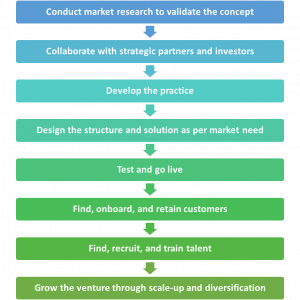
Challenges associated with COVID-19 Vaccination Plans
May 15, 2021
Artificial Intelligence is Not the Future, It’s Now
August 12, 2021A hacker, a hustler, and a hipster… more like an engineer, a marketeer and a designer!

In the world of a startup, what matters most is finding an idea that can truly solve a customer need or problem. You get the idea right; you are on the road to startup stardom. But while it’s the idea that matters a lot, building a business around that idea and taking it to the market successfully is a whole another ballgame.
That is why startup founders are not merely innovators or ideators. They have to be much more than that! Startup founders need to be able to develop a viable business model, test it, recruit early adopters, take the offerings to the market, and sustainably grow the venture. Although most founders try to handle much of this single-handedly, this is clearly not a single person job.
Undeniably, the success of an early stage startup depends on the team that backs it. And this ideal team has to be able to do everything that a startup venture needs for sustainable development and growth. So, what makes up this dream team? What roles do they need to play? And how exactly does it relate with a startup’s learning curve and growth trajectory?
To figure that out, let’s begin by understanding the different stages in a technology startup’s journey.
The Technology Startup Journey

Three Critical Roles That Form the Ideal Technology Startup Team
While it’s easy to visualize all the work that needs to be done, it’s difficult to make a complementing team who covers all the bases, has the required skills and competencies to do this. That is why, an ideal combination for any team is having hackers, hustlers, and hipsters or we can translate it to engineers, marketeers and designers.
Hackers/Engineers
These are technical experts who are responsible for actually building the solution. Hackers can visualize the underlying technology or algorithms that are needed to develop a solution. Inherently analytical, tech-savvy, reliable, and structured; hackers remain focused on building the proof of concept, the solution, the final offering, and then the scaled up versions with continuous improvement.
While typically they are not people centric, they do have a strong grasp over the technology. It is ultimately what they build that sells and without a properly hacked solution, a startup can’t have a sustainable future.
Hustlers/Marketeers
Hustlers are responsible for bringing ideas to life and then sell them for a living. This is the person who can connect the dots to figure out customer needs and innovatively come up with correct projections for them. They shoulder the responsibility to understand and connect with the target market.
Naturally charismatic, extroverted, go-getter, and born with a growth mindset; a hustler thoroughly enjoys networking. And through their prodigious networking, they are able to attract investors, partners, talent, and customers to the startup. With a keen eye on the business model and ROI, a hustler can determine when is the right time to pivot or if it is appropriate to stay the course.
Hipsters/Designers
Hipsters are responsible for the creative output, user experience and customer success. While the hacker is focused on developing the product and the hustler is busy bringing the business, the designers can conceptualize the idea and prepare to match the preferences of target audience.
As they are naturally creative and empathetic, designers care about their customer’s needs. And they work towards continually improving this experience. From A/B testing to, product aesthetics and interface; a designer gives the startup’s offering a competitive advantage.
Final Thoughts
Together, engineers, marketeers, and designers build a team for long-term growth, stability, and success. With their roles clearly defined, a startup can flourish from the powerful combination of their talents and balancing skills. And this dream team can outperform any startup which is backed by big money.
